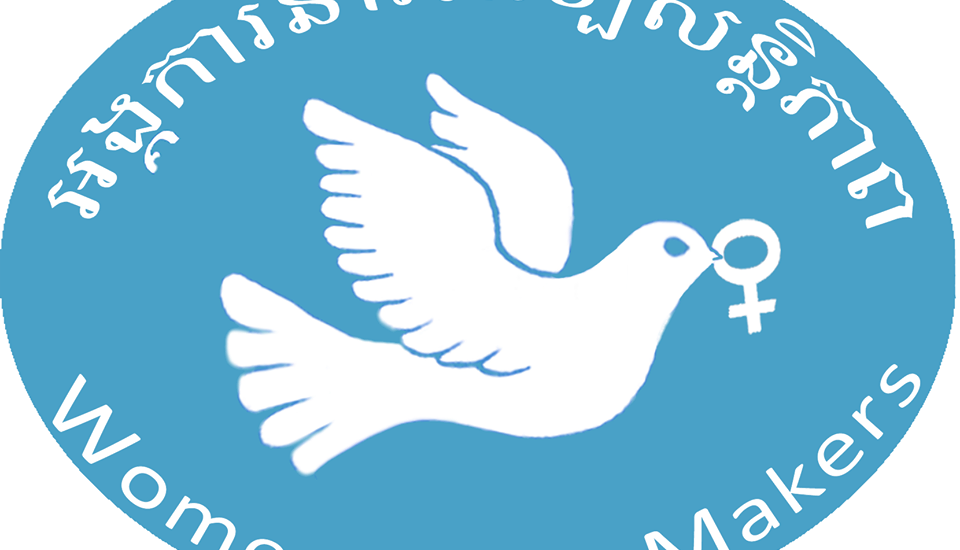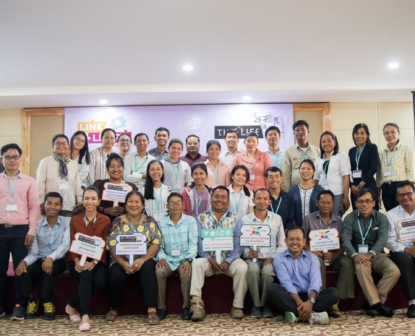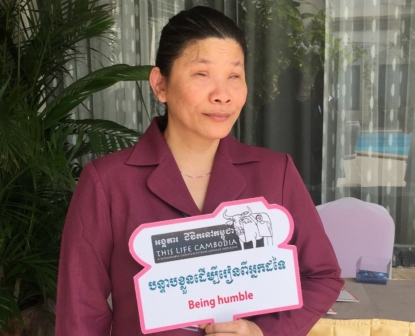Project
Our United Voices
-
Amount Funded
24,999 EUROProject Duration
01 Oct 2019 - 30 Sep 2020 -
-
Lead organisation
-
Women Peace Makers (known as WPM) began as a youth and women-led peacebuilding network in 2000 comprising of mostly female university students who were particularly concerned about conflict and violence against women in their communities.
In 2003, WPM formally registered as a non-profit and non-governmental organisation in Cambodia and began to focus its efforts on empowering women, youth, and communities to address conflict non-violently and to stand up for women’s rights through community mobilisation, awareness-raising, and capacity building on issues related to women’s rights protection and conflict transformation. WPM works very closely with communities across the country; including minority groups, on issues on women, girls, and conflict. WPM has thus established its long-term commitment, skills, experience, and relationship in the community it serves. Over the past two years, the Organisation has initiated, piloted and evolved its localised information gathering methodology called Facilitative Listening Design (FLD), to better understand difficult and sensitive topics directly from the perspectives of communities and bring their voices to target audiences for uptake.
FLD has been tested in sensitive contexts including negative-sentiment against ethnic groups, perceptions of #the Other# along with border areas, and understanding perspectives from adolescent girls in minority groups. The learning from FLD continues to inform interventions and WPM’s direction in addressing a wide range of issues. WPM is grounded in its approach and community voices inform all of its continued learning and strategic direction. At the national level, WPM serves as a steering committee member of the Gender and Development Network (GADNet), a network of 43 NGOs and individuals working on gender and development throughout the country. It is also an active member of The Cambodian NGOs Committee on Convention on the Elimination of all Forms of Discrimination Against Women (NGO-CEDAW), and of the United Nations Youth Advisory Panel (UNYAP).
-
Organisation
Women Peace Makers (known as WPM) began as a youth and women-led peacebuilding network in 2000 comprising of mostly female university students who were particularly concerned about conflict and violence against women in their communities.
In 2003, WPM formally registered as a non-profit and non-governmental organisation in Cambodia and began to focus its efforts on empowering women, youth, and communities to address conflict non-violently and to stand up for women’s rights through community mobilisation, awareness-raising, and capacity building on issues related to women’s rights protection and conflict transformation. WPM works very closely with communities across the country; including minority groups, on issues on women, girls, and conflict. WPM has thus established its long-term commitment, skills, experience, and relationship in the community it serves. Over the past two years, the Organisation has initiated, piloted and evolved its localised information gathering methodology called Facilitative Listening Design (FLD), to better understand difficult and sensitive topics directly from the perspectives of communities and bring their voices to target audiences for uptake.
FLD has been tested in sensitive contexts including negative-sentiment against ethnic groups, perceptions of #the Other# along with border areas, and understanding perspectives from adolescent girls in minority groups. The learning from FLD continues to inform interventions and WPM’s direction in addressing a wide range of issues. WPM is grounded in its approach and community voices inform all of its continued learning and strategic direction. At the national level, WPM serves as a steering committee member of the Gender and Development Network (GADNet), a network of 43 NGOs and individuals working on gender and development throughout the country. It is also an active member of The Cambodian NGOs Committee on Convention on the Elimination of all Forms of Discrimination Against Women (NGO-CEDAW), and of the United Nations Youth Advisory Panel (UNYAP).
-
Project
Our united voices project empowers women facing intersectionality of issues through sharing existing strengths and knowledge for better access to employment and inclusion in an urban society.
The project intends to use an innovative method of:
- Learning by listening;
- Sharing
- Speaking together; bringing marginalised women together around common issues.
Women from four communities: a) Indigenous women, b) Women with disabilities, c) Rural-to-urban migrant women, and d) Women facing abuse are empowered to learn more about their own communities, be better equipped to represent each other, recognise the diverse voices inside their communities, and widen communication across many layers of identity that are found in each community.
The women come together to share their knowledge, teach each other skills and mechanisms that they are using already, sharing both their challenges and resilience in the face of conflict, violence, discrimination and negative sentiment. The ultimate objective of this 12 months project is to explore tools that assist marginalised women to transform conflict in their lives and their communities, through sharing existing strength and knowledge, including those that provide better access to employment and inclusion in an urban society.
-
-
Our united voices project empowers women facing intersectionality of issues through sharing existing strengths and knowledge for better access to employment and inclusion in an urban society.
The project intends to use an innovative method of:
- Learning by listening;
- Sharing
- Speaking together; bringing marginalised women together around common issues.
Women from four communities: a) Indigenous women, b) Women with disabilities, c) Rural-to-urban migrant women, and d) Women facing abuse are empowered to learn more about their own communities, be better equipped to represent each other, recognise the diverse voices inside their communities, and widen communication across many layers of identity that are found in each community.
The women come together to share their knowledge, teach each other skills and mechanisms that they are using already, sharing both their challenges and resilience in the face of conflict, violence, discrimination and negative sentiment. The ultimate objective of this 12 months project is to explore tools that assist marginalised women to transform conflict in their lives and their communities, through sharing existing strength and knowledge, including those that provide better access to employment and inclusion in an urban society.
-
INTRODUCTION
The initiative of Our Turn! “Voicing Out Multiple Marginalization Through Intersectional Solidarity” aims to change the public narrative on multiple marginalized women and influence specific policy and practice discussion at local and national levels on issues they identify through their own knowledge generation and collective ecosystem.
This project intends to work with a diverse rightsholder group of 1). indigenous women, 2). women with blind, 3). LGBTQ+, 4). ethnic, religious, and cultural minorities and 5). interethnic youth by supports them to generate new and relevant knowledge on their own groups, lead customized efforts to engage in their communities. They have their own approaches using Facilitative Listening Design (FLD) for mobilization and skill building, foster solidarity across all marginalized groups to voicing out in advocacy both as individual with special needs and as a collective force that leverages the power of unity.
Influence Goal 1: Indigenous women to advocate for the rape crisis to be taken up by government and civil society at all levels to push for policy and practice that acknowledge what is happening and demand a customized approach for Indigenous women that is grounded in their unique context and worldview.
Influence Goal 2: Blind women to reframe “disability” and put the spotlight on “ability”, to demonstrate a customized model to support blind women into the workforce and promote it as an approach for deeper inclusion for women with “abilities”.
Influence Goal 3: The LGBTQ+ community to change the way society sees sexual orientation and push for the recognition of same-sex, intersex, and gender diverse relationships as equal.
Influence Goal 4: Ethnic, religious, and cultural minorities to build deeper cohesion and push for their inclusion at every level in a diverse Cambodian society and will advocate for change on issues that are marginalizing them in a Khmer-centric system that associates ethnicity with nationality.
Influence Goal 5: Interethnic youth to push the ethnic minority girls’ agenda among ethnic minority groups and in the general public to provide the space for girls’ participation and bring awareness of the challenges they face in their daily lives.
PROJECT IMPLEMENTATION
In 2018, WPM began working with Nika’s Seeing Hands Massage Therapy Center, CIWA, and Dare & Dream Cambodia to launch the 4 Women, 4 Communities, 4 Stories initiative through Voice. However, our informal collaboration started earlier with discussions on how to build connections among doubly marginalized women. We have been working with ethnic, religious, and cultural minorities in Cambodia and neighbouring countries (Thailand and Vietnam) for several years. This led to the “Our Turn” project, which involved diverse rightsholder groups: 1) indigenous women, 2) women with visual impairment, 3) LGBTQ+, 4) ethnic, religious, and cultural minorities, and 5) interethnic youth. The project aimed to assist these groups in generating new and relevant knowledge about their own communities and leading efforts to engage in their communities.
One of the proudest moments of the “Our Turn” Project was when the five communities came together, becoming allies towards one another, marking an incredible achievement. This transformation is remarkable considering they used to be separate entities. It has been an inspiring learning journey working with such diverse marginalized groups. Initially, there were misunderstandings among them due to their various marginalized backgrounds, but they have now united to voice out and effect change in society. This achievement and these results come from leadership within their own community, with coordination among the groups. We utilized various approaches and tools such as knowledge dissemination, community deepening, unity building, and influencing strategies. Our understanding of the community was shaped through FLD research and research conducted during the initial phase of Voice. Capacity building was provided as part of our efforts. The most successful empowerment approaches proved to be unity and influencing. Each community had the opportunity to learn from one another and understand the unique context of each community.
IMPACT AND TRANSFORMATION
The project has had a significant impact in various areas:
- Self-development: Participants experienced significant changes in self-esteem and agency. They were able to engage in political participation and advocate for themselves and their communities. The beneficiaries take pride in being who they are. For example, Vanton, a Gay Peer Support member, expressed, “Be who you are, be a good person, and don’t abandon yourself so that people will see your value.” An Indigenous woman representative in Kampong Thom Province, Ms. Khen Sreynang, shared her personal transformation, saying, “Before, I used to think badly about myself because of my identity and beauty standards. I always believed that I could not do anything. Yet, I also used to have negative perspectives toward other diverse groups as well. This is because I had never known them and understood their groups. After getting to know the other groups, I realized the challenges that other ethnic groups face, which are similar to mine.” https://voice.global/stories/vantons-story-of-change/
- Publications and Research: The project’s findings were published in two publications: “LGBTIQ Voice” and “The Diverse Cambodian Woman.”
LGBTIQ VOICES: https://wpmcambodia.org/project/our-turn-lgbtiq-voices/
The Diverse Cambodian Woman: https://wpmcambodia.org/project/our-turn-the-diverse-cambodian-woman/
- Transformative Impact: Significant changes were observed in self-acceptance and group acceptance. For instance, blind trainers actively working demonstrated the transformative impact of the project.
- Advocacy and Materials: The project produced advocacy materials such as T-shirts, hats, krama, tote bags, and stickers.
- Influencing events: The project hosted various events, including the Report Launching on Gender-Based Violence against Indigenous Women on August 9th, 2022, and the “Closing Ceremony: Anma and Shiatsu Therapeutic Massage for Women with Disability” at Diakonia Center on July 14th, 2022. Other events included the Making the Space public forum, Pride Month, International Women’s Day, 16 Days of Activism against Gender-Based Violence, Blind Art Exhibition, and International Day of People with Disability, International Youth Days as well as a Facebook Live Show. The Blind Art exhibitions provided a transformative journey for visitors, creating a space where sighted individuals could immerse themselves in the unique perspective of the visually impaired. Through tactile art, sound installations, the darkest place, and evocative narratives, these exhibits not only captivated the public but also deeply resonated with stakeholders, compelling them to reflect on the profound challenges faced by the blind community. The showcased artworks not only celebrated artistic expression but also served as powerful catalysts for empathy, fostering a greater understanding of the complexities of navigating a sightless world.
Message from one of the participants during the Blind Art Exhibition from the reflection books:
What a profound experience. Thanks, you for having me to understand the experience of those who cannot see. walking in the dark was a scary experience for me the noises sounded so loud and even tiny dips in the floor felt really worrying. As a to educate my students to be mindful of the experience of visually impaired people and have even more respect for the courage it taken someone who in blind to get up and go out into the world each day. Feeling Nika presence in front of me gave me a sense of safety and connection in the darkness. Thanks, you for being a huge inspection- From Sopnie.
In terms of improving living conditions, the blind woman trainees demonstrated their ‘Ability Beyond Disability’ when given sufficient and accessible opportunities to work and earn for themselves. Oun Sreyda, a blind woman trainee, expressed her gratitude for the support and the opportunity to work, “I used to have general knowledge, but now I have a skill which is really important for me, especially as a blind woman. It is very challenging for blind people to get a job. As blind women, we have the ability to access education and work. I am thankful to Ms. Tath Nika, the Trainer, and the support from Women Peace Makers for allowing and supporting me. As a result, I am able to work to earn a living to support myself.” This showcases that people with disabilities have the ability and can succeed. I am now working in a private massage therapy to support myself through my bachelor’s degree at Royal University of Phnom Penh (RUPP).
LESSON LEARNED
Throughout the project implementation, we have acquired invaluable insights into the essential nature of adaptability, connection-building, and the establishment of safe space. We have learned that fostering strong connections within diverse communities is crucial to engendering trust, collaboration, and a profound understanding of community dynamics. Additionally, we have realized the significance of cultivating a robust network and leveraging diverse methods, such as Facebook Live shows, art exhibitions, Forum Theatre, and empathy, to mobilize a wide spectrum of groups. Our comprehensive approach involved meticulous documentation through the story of change, detailed report writing, and visual documentation. This allowed us to track milestones and effectively convey the project’s core essence.
INCLUSION
At Women Peace Makers (WPM), we are dedicated to creating a peaceful and gender-just society where everyone, regardless of identity and ability, can reach their full potential and live free from violence. The “Our Turn” project is a powerful testament to the transformative impact of intersectional solidarity among marginalized groups. We call for your generous support to help us create a world that embraces intersectionality and empowers all individuals.
-
News





